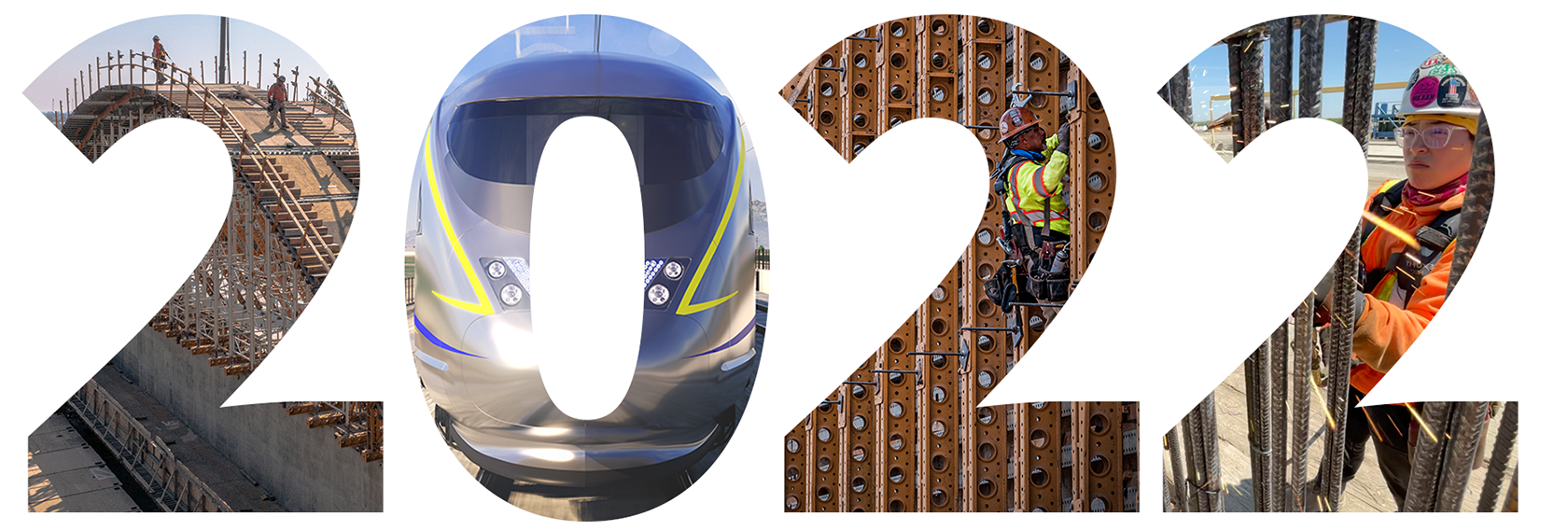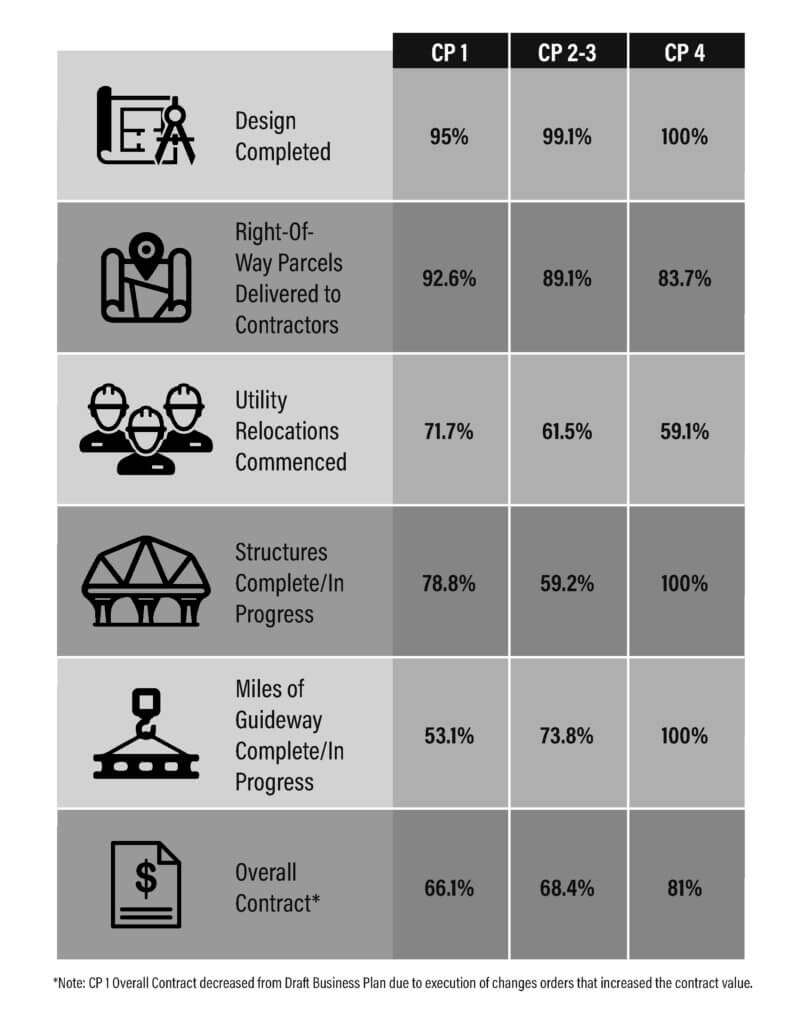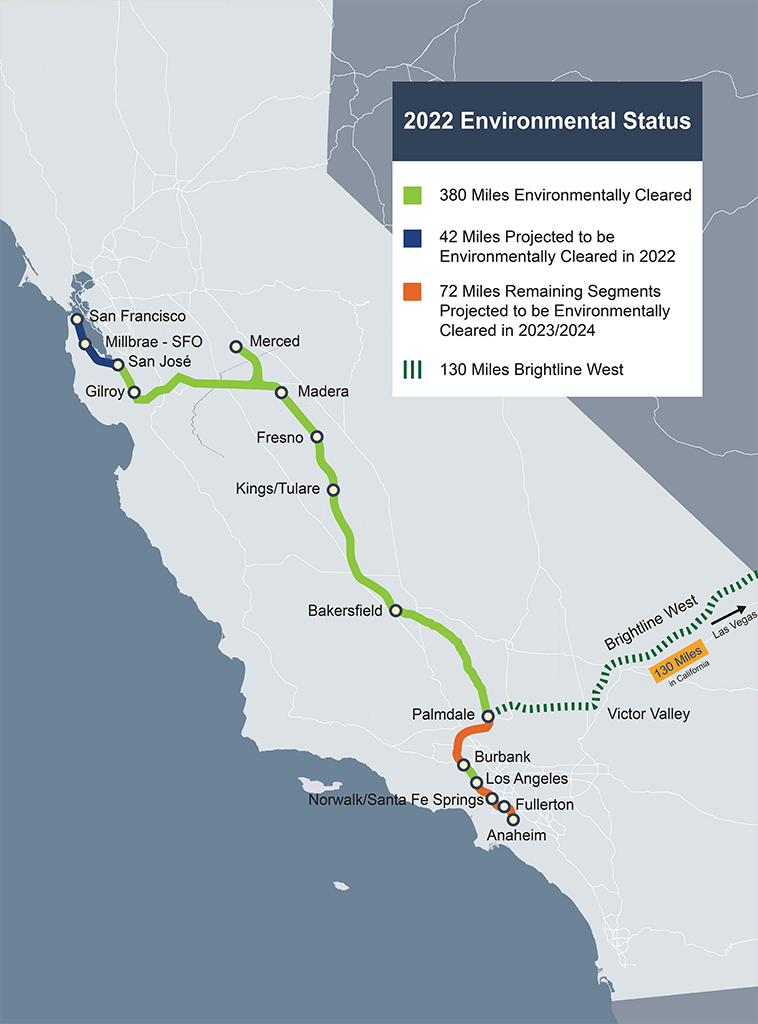
2022 Business Plan
A Draft 2022 Business Plan was issued February 8, 2022, with a 60-day public comment period that ran through April 11, 2022. The 2022 Business Plan was adopted by the Authority Board of Directors on Wednesday, April 27, and submitted to the state legislature on Friday, May 6, 2022.
For questions and to leave comments, please reach out to us at info@hsr.ca.gov
Chapter Highlights
Message From the CEO
- The Authority is making meaningful progress in three key areas: Central Valley construction, right-of-way and environmental review.
- The most significant opportunities have been the new federal funding and Governor Newsom’s proposed $15 billion program of statewide transportation infrastructure.
- The Authority remains committed to building a modern, electrified high-speed rail system that meets the state’s climate and sustainability goals.

photo courtesy of whitehouse.gov
“Why do I always talk about passenger rail, and particularly high-speed rail? You realize the Chinese are now building another high-speed rail line that will go up to 300 miles per hour? You say, ‘What difference does that make, Biden?’ Well, guess what? If you can get in a train and go from here to Washington much faster than you can go in an automobile, you take a train. You take the train. We will take literally millions of automobiles off the road — off the road — saving tens of millions of barrels of oil, dealing with cleaning up the air.”
Notable
- The 2022 Business Plan:
- Provides updates on milestones and progress since April 2021, when the 2020 Business Plan was published;
- Incudes limited updates to forecasts; and
- Previews what will be covered in the 2023 Project Update Report.
- With the opportunity for new, more stable funding, we will work to:
- Deliver electrified double-track operation segment connecting Merced, Fresno and Bakersfield as soon as possible;
- Environmentally clear the full 500-mile system from San Francisco to Los Angeles/Anaheim;
- Advance design statewide as each project section is cleared, preparing the sections for future construction funding;
- Leverage new federal and state funds for targeted statewide investments, particularly in shared corridors; and
- Reevaluate funding scenarios to extend high-speed rail beyond the Central Valley to the Bay Area.
Where We Are Today
Progress in Key Areas in the Construction Packages
Data as of March 31, 2022

Progress in Key Areas in the Construction Packages text description
Overview
This chart shows progress in key areas of progress in the high-speed rail construction packages in the Central Valley. CP 1 is 95.0% design completed, 92.6% Right-of-Way Parcels Delivered to Contractors, 71.7% of utility relocations commenced, 78.8% of structures complete/in progress, 53.1% miles of guideway complete/in progress and 66.1% of overall contract complete. CP 2-3 is 99.1% design completed, 89.1% Right-of-Way Parcels Delivered to Contractors, 61.5% of utility relocations commenced, 59.2% of structures complete/in progress, 73.8% miles of guideway complete/in progress and 68.4% of overall contract complete. CP 4 is 100% design completed, 83.7% Right-of-Way Parcels Delivered to Contractors, 59.1% of utility relocations commenced, 100% of structures complete/in progress, 100% miles of guideway complete/in progress and 81% of overall contract complete.
Map of Environmental Status and Progress
Distances based on preferred alternatives identified and subject to final environmental documentation.

Map of Environmental Status and Progress text description
Overview
This map shows current progress of environmental clearance of high-speed rail in California, including 380 miles environmentally cleared in 2022 in the Central Valley, Burbank to Los Angeles, and San José to Merced, 42 miles projected to be environmentally cleared in 2022 from San Francisco to San José, 72 miles of remaining segments in Southern California projected to be environmentally cleared in 2023/2024, and 130 miles of high-speed rail between the Nevada border and Palmdale.
Technical Reports
The information presented in the following technical reports provide background support for information presented in Chapter 5 of the 2022 Business Plan. As the 2020 Business Plan was just completed in April 2021, only the Capital Cost Basis of Estimate Report has been updated. All other reports and information presented have remained the same.
- 50-Year Lifecycle Capital Cost Model Documentation
- Capital Cost Basis of Estimate Report
- High, Medium and Low Cash Flow Analysis
- Operations and Maintenance Cost Model Documentation
- Ridership and Revenue Forecasting
- Service Planning Methodology
- Ridership and Revenue Risk Analysis
- Ridership and Revenue Model
Factsheets
More information about the California high-speed rail program can be found in the Authority’s suite of factsheets. Key facts about the program are highlighted in the factsheets identified below. These factsheets, and more, can be found on the Authority’s website at https://hsr.ca.gov/communications-outreach/info-center/factsheets/.
- High-Speed Rail by Region
- About the High-Speed Rail Program
- Benefits of High-Speed Rail
- Funding and Investments
Contact
Board of Directors
Thomas Richards, Chair
Nancy Miller, Vice Chair
Ernest M. Camacho
Martha M. Escutia
James C. Ghielmetti
Margaret Peña
Henry Perea
Lynn Schenk
Anthony Williams
boardmembers@hsr.ca.gov
Chief Executive Officer
Brian P. Kelly
boardmembers@hsr.ca.gov
Ex Officio Board Members
Honorable Dr. Joaquin Arambula
Honorable Lena Gonzalez
boardmembers@hsr.ca.gov
California High-Speed Rail Authority
770 L Street, Suite 620
Sacramento, CA 95814
(916) 324-1541
info@hsr.ca.gov
NOTICE
The California High-Speed Rail Authority (Authority) is required by Public Utilities Code Section 185033 to prepare, publish, adopt, and submit an updated Business Plan to the Legislature on May 1. The statute also dictates that, at least 60 days prior to submittal to the Legislature, the Authority must publish a draft Business Plan for public review and comment. Business plans are published in even-numbered years, and the next business plan will be issued in 2024.
Business plans represent the status of the high-speed rail program at a point in time, and summarize the Authority’s approach to implementing the system. Business Plans include:
- Summary of progress over last two years
- Review current challenges and how to address them
- Updated capital cost and other estimates
- Updated ridership and revenue forecasts

